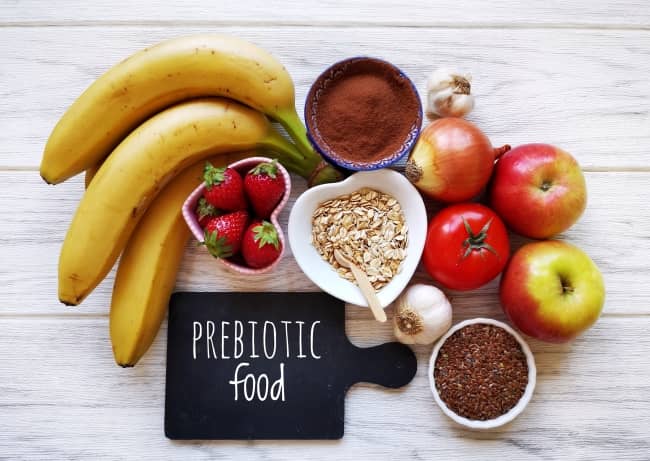6 Steps to Improving Your Digestion – Gut-friendly Tips to Feel Good All Day
Did you know your gut is home to trillions of bacteria, viruses, and yeasts?
Gut health affects the entire body, including brain health, metabolism, heart health, sleep quality, digestion, the immune system, and more.
We put together a list of the best ways to improve your digestion and support gut health, including the best foods for gut health and the best gut health supplements.
6 Steps to Improving Your Digestion: The Best Lifestyle Tips for Gut Health
1. Food Quality
Highly processed foods, such as frozen meals, can cause spikes in blood sugar and increased inflammation. This can hurt the digestive system.
If you are trying to improve your diet and support healthy digestion, the right foods may help.
Some of the best gut-friendly foods to include in your diet are:
- Leafy greens
- Avocado
- Nuts
- Meat
- Whole grains
- Bone broth
- Low-fructose fruits such as oranges, berries, grapes, and kiwis
- High-quality lean protein
- Fermented foods
- Broccoli
- Eggs
- Salmon skin
- Collagen supplements
Certain foods or habits can cause you to swallow excess air or contribute to gas production in the digestive system.
If you want to cut back on bloating, you may want to pay attention to how the following foods, drinks, and habits make you feel:
- Beans
- Broccoli
- Apples
- Eating too fast
- Chewing gum
- Onions
- Carbonated drinks
- Wearing ill-fitting dentures
You may want to consider keeping a food diary and making note of any foods or drinks that seem to cause you digestive trouble.
Related Reading: Ideas for a Healthy Grocery Shopping List
2. Hydration
Drinking enough water has many health benefits, including digestive support. Drinking water throughout the day and with meals can help prevent constipation, assist your body in breaking down food, help food travel through your digestive system, and support nutrient absorption.
If you struggle to drink enough water every, try these tips to increase hydration:
- Add cucumber slices to your water
- Add a handful of frozen berries to a glass of water
- Add a sprig of mint to your water
- Squeeze fresh lemon juice into your water
- Always carry a water bottle with you
- If you drink sugary drinks or soda throughout the day, try replacing one serving of soda or juice with a glass of water instead
- Set an alarm on your phone for every 30 minutes to an hour and drink a glass of water when the timer goes off
- Get in the habit of drinking a glass of water before every meal (drinking a glass of water before you eat may help with weight loss)
- Eat foods with high water content, such as lettuce, zucchini, watermelon, celery, and cantaloupe
- Drink herbal, caffeine-free tea
You’ll also want to determine how much water you should drink in a day. Eight 8-ounce glasses of water per day is a common recommendation. However, The National Academy of Medicine (NAM) recommends the following daily fluid intake levels:
- Men, 19 and older: 13 cups, or 104 ounces
- Women, 19 and older: 9 cups, or 72 ounces
- Pregnant women: 10 cups, or 80 ounces
- Breastfeeding women: 13 cups, or 104 ounces
If you live in a hot climate, participate in intense workouts, or work outside, you will likely need to increase the amount of fluid you drink in a day.
Related Reading: The Health Benefits of Drinking Enough Water
3. Dietary Fiber
Fiber plays a variety of crucial roles in the body and offers many health benefits. The benefits of fiber include weight loss support, gut health support, digestive support, and more.
The best high-fiber foods include:
- Dried fruit (prunes, raisins, figs)
- Nuts and seeds
- Legumes, such as chickpeas, beans, and lentils
- Oats
- Whole wheat bread
- Berries
- Quinoa
- Apples
- Asparagus
- Broccoli
- Pears
- Brown rice
- Bulgur
- Barley
- Leeks
- Sweet potatoes
- Popcorn
- Avocados
- Beets
- Squash
- Brussel sprouts
- Oranges
Along with eating enough fiber, drinking enough fluids ensures that fiber can absorb water and help food travel through the digestive system easily.
If you struggle to eat enough fiber, try these tips:
- Choose whole-grain pasta and whole-wheat bread instead of white-flour versions
- Choose brown rice instead of white rice
- Include at least one fruit or vegetable with each meal
- Use whole wheat flour instead of white flour when baking
- Snack on high-fiber fruits and veggies throughout the day
- Cook a meatless meal once a week with beans or lentils
4. Prebiotic Foods
Prebiotics are a class of fibers — inulin, fructooligosaccharides (FOS), and galactooligosaccharides (GOS) — that cannot be digested by the body. Prebiotics serves as an important food source for the good bacteria in the gut.
Including prebiotics in your diet may help support gut health, improve digestion, support a healthy immune system, and nourish the good bacteria in your gut.
The best prebiotic foods include:
- Asparagus
- Bananas
- Jerusalem artichokes
- Onions
- Garlic
- Apples
- Whole oats
Related Reading: A Guide to Gut Health
5. Probiotic Foods
Bacteria play a variety of roles in the gut, including digestive support. Probiotics are referred to as the “good” bacteria in the gut that support gut health and good digestion.
Although additional research is needed to understand all the complexities of the microbiome, you may want to try adding some probiotic foods to your diet.
Here are some of the best probiotic foods to include in your diet and help improve digestion:
- Sourdough bread
- Sauerkraut
- Kombucha
- Yogurt
- Miso
- Kefir
- Certain soft cheeses
- Tempeh
- Kimchi
6. Stress and Sleep
High levels of stress can harm digestion. To help improve digestion and maintain good mental and physical health, it is important to keep your stress levels in check.
You can help manage stress levels by:
- Having a good support network of friends and loved ones
- Setting aside time to relax and enjoy your favorite hobbies
- Getting enough exercise (Read more about the best exercises for relieving stress)
- Getting enough sleep and trying to follow a consistent sleep schedule
- Eating foods that fight stress
- Taking your time when eating and practice mindful eating
- Keeping a gratitude journal
- Practicing deep breathing
Related Reading: Natural Tips to Relieve Anxiety and Stress
Are Gut Health Supplements Worth It?
Although a healthy diet filled with whole foods and balanced nutrition is vital for gut health, there are a variety of gut health supplements that may help complement a healthy diet.
Isagenix created proprietary formulas dedicated to gut health, including:
- IsaBiome Probiotics — With over 10 strains of clinically tested bacteria, this gut-friendly supplement provides good bacteria to help support healthy digestion and overall health.
- Zija Core Moringa Triotic Gut Support — With three clinically studied probiotic strains, this supplement was formulated to help support nutrient absorption, promote healthy digestion, and support a healthy gut microbiome.
Final Thoughts
Although gut health is an extremely complex topic, scientists agree that gut health plays a significant role in overall health.
Eating a gut-friendly diet, drinking enough water, getting enough sleep, and keeping your stress levels in check can help you improve your digestion and support gut health.
Please contact us if you have questions or would like personalized recommendations on the best gut health supplements.












